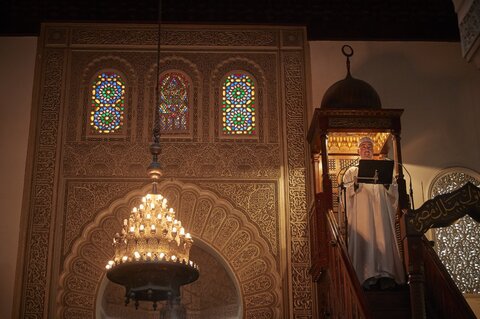Hawzah News Agency - Epistemological declines began with the explanation of human consciousness within the water-tight circle of the naturalistic description of Aristotle’s theory of nature, empiricism and experiences. The majority of Western intellectuals, institutions and media have developed a pattern of discussion and conclusions which somehow produce narratives that are circulated worldwide.
Western leaders, media, intelligentsia and their followers were prompt in highlighting the act of terrorism in France, Canada, Austria, Afghanistan and Mozambique, in the last few weeks and their media agencies linked terrorism with Islam. They linked the crimes of individuals to the Muslim community. They failed to condemn the absolute freedom of speech. The response to terrorism extended "institutional extremism" resulting in large-scale humiliations and search operations in Muslim localities in Western Europe. War on terrorism became a common ground in the West, but they remain silent over the violation of the rule of law and political responsibility.
European institutions are silent on the voices of the victims. The Western media and the governments have not highlighted the fact that since 2013, at least 1,700 French nationals joined the ranks of Daesh in Iraq and Syria.
The European narratives fail to question why Daesh and Salafis are given preference vis-a-vis public narrative on Islam. According to a report by Globsec, "European jihad" is to some extent criminal in nature, as a sizeable minority of its adherents, or 56 cases (28%) of those analyzed, have a history of a previous arrest (i.e., before 2015). They had earlier committed crimes including (violent) robberies, burglaries and thefts, illicit trade including drug dealing, trafficking of goods and fraud, violent crimes and terrorism-related crimes.
The average age of the individuals (European extremism) in the 197 related cases covered in this report is 30.5. The average age for criminals turned terrorists is almost the same, at 30.9. Criminals turned terrorists, however, are more homegrown, with 71% of them born in the European Union and 89% possessing EU citizenship.
The report mentions that European extremists are not well educated. According to the report, only 20% have a high-school diploma, and just three completed undergraduate studies. Amongst the criminals turned terrorists only 8% attended high school.
Almost 64% (or 126 out of 197) of the individuals included in the dataset had first been exposed to a radical ideology more than six months prior to their arrest. This underscores the fact that a sizeable chunk of the European extremism milieu is composed of individuals with long records of participation in radical networks in Europe.
The report mentions 88 cases (45% of the total dataset) in which radicalization was instigated offline and only 19 individuals themselves sought radical exposure in an online environment.
The key offline domain was a prison. Around 54% of these prisoners were exposed to radical ideology for the first time while serving their sentences. This phenomenon is most prominent in France, Belgium, Germany and Italy.
French case
Weeks before the killing of historian teacher Samuel Paty, French President Emmanuel Macron was denouncing Islam openly for political reasons. Under Francois Hollande’s presidency, the former French Prime Minister Manuel Valls seized on the terrorist attacks to advance an anti-religious agenda in the name of security.
For French public opinion, organizing Islam needs to be a security question. The 2004 law bans religious symbols in public schools and a 2010 ban on the full-face veil in public, and in January 2018, a ban on religious garb in the National Assembly. This seems to be a policy to stifle religious expression, identity and culture.
In an article published in The Atlantic, Paris-based scholar Karina Piser refers to Olivier Roy, a scholar of Islam and professor at the European University Institute in Florence, saying “We’re in the process of trying to organize a religion that concerns 6 million people in France, in order to prevent 200 of them from becoming terrorists. Can’t we see that it’s absurd?”
No organized Muslim group in any part of Europe has owned the murderers of journalists, teachers and others in Europe. The individual terrorists with objectionable backgrounds were under intelligence monitoring.
The feeling of disagreement, pain and anger of a Muslim on the offensive and contemptuous acts against Prophet Muhammad is quite different from the act of violence and terrorism. About 60,000 books have been written against Muslims and Islam in the last hundred years. Such kind of contempt has happened earlier also and the response was either condemnation or intellectual rejoinder.
Muslim scholars never subscribed to violence. Prophet Muhammad never justified violence for such contempt during his lifetime. Violence and terrorism as a reaction to contemptuous acts are of recent origin and they are being planned by the scriptwriters and directors of global terrorism.
Terrorism has become a powerful political tool for Islamophobia, Turcophobia and Muslim bashing. There are beneficiaries of terrorism since 2001, and they have been misusing the state-power against Muslims and their institutions in North Africa, Levant – the geographical area in the Eastern Mediterranean region of Western Asia – and South Asia.
Dozens of anti-Muslim militias are active in South Asia. The Western media has not bothered to research the background of such terrorism because a genuine investigation would probably present a different picture. Terrorism in Europe since 2001 has also benefited political parties, security and intelligence institutions to identify such crimes with Muslims.
Terrorism also benefited faith-based nongovernmental organizations (NGOs) in Europe to revive Christianity and radicalism within the Christian community. Such NGOs are also encouraged to expedite the conversion of Muslim citizens of Europe and the refugees. Religious radicalism existing in several Protestant variants has mixed with nationalism in some European countries and their acceptability among the secular-modernists is increasing.

